In this post, you’ll learn how to go about charging for your event planning service. This formula also works for Party Planners, Wedding Planners, and Day-Of Coordinators.
Hundreds of event planners have used the content in this post to determine their hourly price and their package pricing. Others have used it to increase their prices and stop working with discount shopping clients who don’t appreciate the value of their event planning service
Let’s get started.
STEP 1: Research What Your Competitors Are Charging
Just like you price match when shopping, your event planning customers do the same. What your competitor’s charge may impact how much customers are willing to pay for your services. The idea here is not to copy your competitor’s pricing, but to use this information to inform your own pricing calculation. It is also good information to have when discussing pricing with potential clients who might reference what your competitors are charging. Most importantly, this is one of the best ways to provide yourself with a basic pricing guide when you’re new to the industry and have no idea what to charge.
Here’s what I often ask event planners:
How can you confidently say you are the most reasonably priced or offering the best value if you are not aware of what you’re up against?
Before you settle on a price for your event planning services, call around or browse the internet to find what other event planners in your area are charging.
According to ZipRecruiter, event planners in the United States were making anywhere from $13.46 to $43.75 per hour, plus vendor commissions. With the average event planner making $30.45 per hour.
Once you’ve completed your research list the three (3) most common prices quoted by event planners in your area. You can a chart like the one listed below:

Now that you have your three (3) comparison prices, sit with these prices for a moment and try to determine where your price should fall. Evaluate the three prices, your skills, experience, knowledge, and pick a price.
You read correctly, just select a number that works for you. I promise there is a method to this madness to calculate your final price.
PRO TIP: Remember to never price your services lower than any of the three competitor prices. It might seem like a good idea if you are new to the industry to compete based on price; however, it takes just as much of your time and effort to plan a wedding at $15 per hour as it does at $75 per hour.
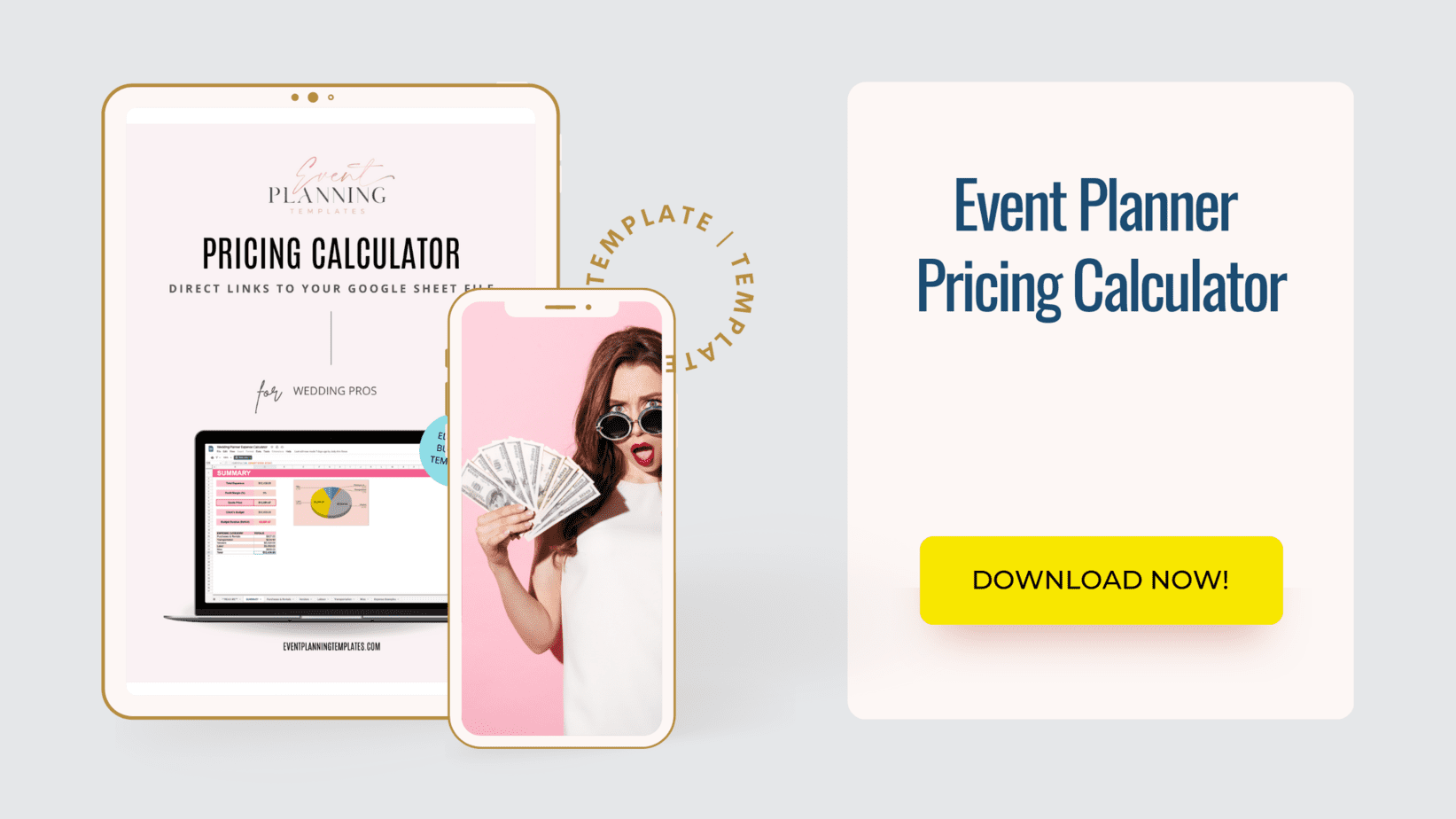
STEP 2: Determine Your Ideal Salary
Now that you know what your competitors are charging, let’s dive into how much you would like to make from your event planning business.
Let’s dream with me for a few minutes.
Start by asking yourself how much you want (or need) to make each year. This is called your Ideal Salary. We are going to use this number to calculate your ideal hourly rate. Here’s how:
The average event planner works 50-60 hours per week (notice we said average). That is equal to approximately 3000 hours in a year, assuming a two (2) week vacation. Here’s the calculation:
(50 weeks x 60 hours per week = 3000 hours)
To determine your minimum hourly rate, take your ideal annual salary and divide it by 3000. For example, if you want to earn $75,000 a year, you should charge a minimum of $25/hour. This would be the lowest price you could charge to earn $75,000.
Let’s remember that these hours will vary depending on if you operate your event planning business full-time, part-time, or go full throttle working 7 days a week with 14-hour days on the weekends (I’m looking at you wedding planners).
($75,000 / 3000 = $25 per hour)
Go ahead and try it out on your own. Take the ideal salary number in the second column below and divide it by the number of hours in the first column to calculate your hourly rate. Try a few different salary amounts to see where your ideal hourly rate should fall.
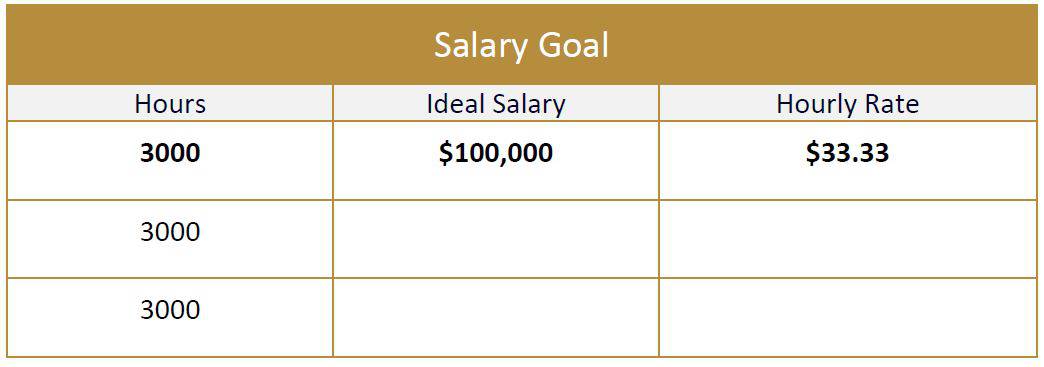
PRO TIP: If you're a Day of Coordinator, this is also a great way to determine your Day of Coordinator rate. If you only charge for your on-site time at the event rather than a package, this is ideal. We will dive deeper into this later on in the article.
STEP 3: Determine Your Realistic Hourly Rate
Now that we have calculated the lowest satisfactory rate that sufficiently values your time (STEP 2), let’s take it up a notch.
If you are a single-person operation it will be almost impossible to work on events for 60 hours a week, 10 hours per day (assuming 1 day off during a 7-day work week). Most entrepreneurs find that only about 50% of their time is billable (at 10 hours that’s equal to 5 hours per day). While the other 50% is spent looking for new business, managing clients, and taking care of the administration of the business. That means if you still wish to make $75,000/year, you will need to increase your rate. Using our ideal number from STEP 2, you should be charging at least $50/hour.
(3000 x 50%) = 1500 x ($50) = $75,000
Go ahead and try it out on your own. Take the ideal salary number in the second column below and divide it by the number of hours in the first column to calculate your realistic hourly rate. Try out a few ideal salary options to get a better idea of where you would like to be.
You now have the formula needed to determine the realistic hourly rate needed to achieve your ideal salary, or set your ideal work hours and use this to determine your best rate.
Now let’s adjust for costs.
QUICK NOTE: You can also compare this to the average event planner salary in your area to see where you land.
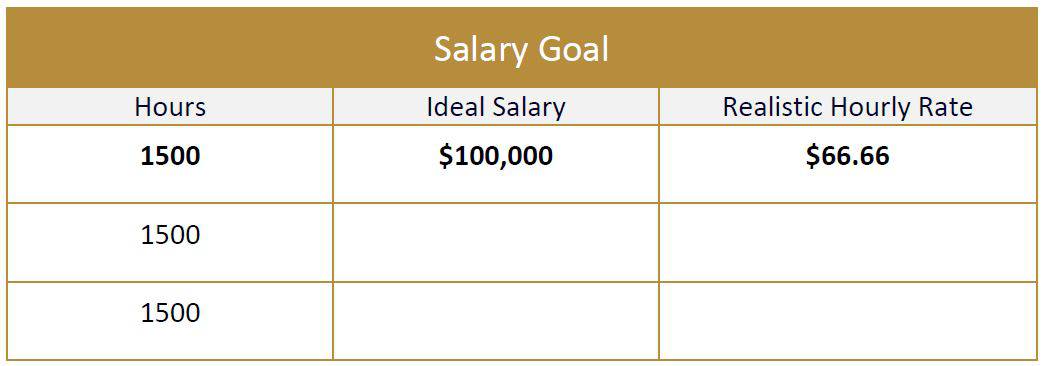
STEP 4: Add in your Costs
Once you have determined how much you want to make each year, and how many hours you can realistically spend planning events, you will have to do a little math and calculate your operating costs.
Take a moment to think about all of the costs that you will have to cover for your business. Think about indirect costs such as your Internet, website operating cost, software or programs, electricity, and phone, to direct costs such as office supplies and event insurance (Grab this info from your business plan!).
Once you have broken down all of the costs, remember to add those to your final rates. For example: Let’s say it costs you $10 per hour to operate your event planning business. That might look like this:
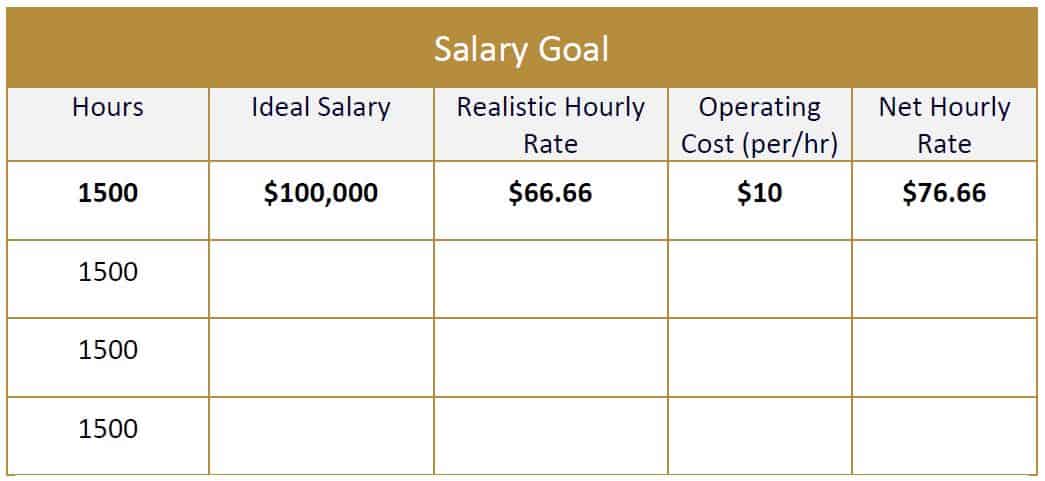
PRO TIP: To keep your ideal salary at the same amount, you will need to add your operating costs to your realistic hourly rate. This will give you what most Accountants like to call your NET HOURLY RATE.
And that’s the Math.
With this formula, you can calculate the best hourly rate for your event planning service. This will help you to determine without a doubt what you should be charging clients.
But let’s be honest, that’s not where it ends because event planners all use varying pricing structures. From hourly rate, to percentage pricing to flat fee/package pricing. Let’s look at each of these structures and how to determine the best option for your business and clients.
But before we look at all the pricing structures, let’s address a missing piece:
STEP 5: Charging for your Event Planning Service
Remember the “random” number you selected in STEP 1 after reviewing your competitor’s pricing?
How does this number compare to your Net Hourly Rate from STEP 4 above? If it is fairly close your pricing guessing game is solved. If the price you believe you should be charging is significantly lower or higher than your competitors, I would like you to explore the following questions:
- Are rates in your area lower/higher than in other nearby cities?
- Do you believe you are lacking the skills or knowledge that other event planners in your area possess?
- What additional value can you provide to clients that could eliminate this gap?
- Is your price higher because you offer a service that is higher in value?
- Is your ideal salary achievable with the number of hours you’re able to commit to your business?
Time to get your thinking cap on!
PRO TIP: With that said, I never recommend that event planners, wedding planners, or party planners charge for their time by the hour. I like my clients to know what an hour of their time is worth for situations where it might be needed, but I recommend going with a flat-fee / package pricing or percentage pricing.
Let me break it all down in the next section.

STEP 6: Best Pricing Structures for Event Planners
Hourly Pricing
This pricing structure, as the name suggests, is where you charge your event planning clients on an hourly basis. This means if an event takes 5 hours to to plan, you will charge them for 5 hours at your hourly rate.
I won’t dive too deeply into this structure, since it was covered in-depth at the beginning of this article as the basis for our calculations. What I will look at however are the pros and cons of using this pricing structure.
Advantages / Disadvantages of Hourly Pricing for Event Planners
The advantage of using the hourly pricing structure is that your clients know exactly what your rate is when they hire you. There is no need to make adjustments or come up with custom pricing as your hourly price is already set.
The disadvantage of using hourly pricing is that the price will change based on the number of hours required for the project. This can be an advantage to the event planner, however, if you are working with clients who are budget-conscious they might try to reduce the hours needed for a project in the hopes of saving money, without much thought to the impact on the quality of the event delivery.
Also depending on your level of experience in the industry hourly pricing can vary by project. For example, when I first started as an event planner, planning a conference could take me a couple of weeks. After working as a corporate event planner for over 15 years, I could have all the major items of a conference planned without a week. The disadvantage of this is that the better you get at planning, the lower your rate is, which is counterintuitive. Our goal as event planners is to have our rates increase with our skills and experience
This is why I don’t recommend using hourly pricing unless it’s the best option for a unique or one-off event. One example is for Day-Of Coordination.
Day-Of Coordination Pricing
There are some cases where hourly pricing might be used for Day-Of Coordination services. Particularly for clients who only need someone on the day-of to manage the roll-out of their event day logistics. However, in reality, most Day-Of Coordination packages and services start weeks or even months before the day of the event and include vendor coordination and management before the event. In those cases, I would recommend a flat fee or package pricing structure instead.
This brings me to the next pricing structure.
Flat fee or Package Pricing
A flat-free pricing structure, often also referred to as Package pricing, is a pricing model where the client is charged one flat fee for your event planning service. This pricing structure is popular amongst wedding planners and party planners. This works well as these planners often have specific packages with specific services for one set price.
Personally, I love this pricing structure because of the transparency, and your clients will too.
Advantages / Disadvantages of Flat-fee Pricing for Event Planners
The advantage of flat fee/package pricing is that everyone is on the same page. Your clients will know exactly what the amount they can expect to pay is, and exactly what services will be included at that cost.
Some examples of these could be:
- Full-service wedding planning Package
- Partial wedding planning Package
- Month-Of Coordination Package
- 1st Birthday Party Decor Package
- etc.
Flat-fee packages can also be customized as needed. You don’t have to worry about not being able to charge for additional services. I highly recommend making it clear to clients in your event planning contract, that services outside of your packages are an additional charge.
The disadvantage of flat fee pricing is that it might not work for all your clients, but this can be easily fixed by customizing your package and pricing as needed for that client. The other disadvantage is that flat-fee pricing might not work for large-scale events where the scope is often changing. For example conferences and festivals.
This brings me to the third pricing structure and why I recommend it for corporate event planners.
Percentage Pricing
Percentage pricing in definition charges a percentage of an event cost for the event planner’s fee. This is a pricing structure that I highly recommend for large-scale events such as conferences, sporting events, and festivals. Based on industry standards, I also recommend a percentage between 15 % – 20%.
Advantages / Disadvantages of Percentage Pricing for Event Planners
The advantage of using a percentage pricing model is that if the planner and/or organizers have never held this specific event before, it gives them the flexibility of getting compensated accurately for their time and effort as the event duties and scope increase.
The disadvantage of using the percentage pricing model is that it does not work for all types of events. This is why it’s not a model I would recommend for say, wedding planners, where clients appreciate more transparency and to not have fees fluctuate with every decision change.
LEARN FROM MY MISTAKES: I think back to my first time hosting a fundraiser that I thought would be a walk in the park and went with a flat-fee pricing model. I later discovered that the organization wasn't as organized as my previous clients and it required a lot more time securing sponsors and working with media than I had accounted for. If I had the foresight that I do now, that client would have been charged using the percentage pricing structure. This would allow me to freely spend the time securing sponsors and chasing media features without cutting into my profit. But as they say, hindsight is 20/20.

STEP 7: Additional Considerations when Charging for Your Event Planning Services
I promised this would be a complete pricing guide. I cannot wrap up this article without discussing a few items that can also impact your pricing.
Let’s get into it.
Vendor Commissions & Markups
In the event planning industry, it’s often standard for vendors to offer discounts to event planners. This could be based on years of experience working together, or a show of appreciation for business referrals. The reason I wanted to discuss this, however, is that depending on if you choose to pass this discount on to clients, it could impact how much you charge.
For example, passing a discount on to a client could lower the price you charge them.
But I wouldn’t be thorough if I didn’t bring this up as a consideration when trying to determine your price.
Customer Deposits
I wanted to address the issue of customer deposits. Not as it relates to how much to charge, but because it is a question I find comes up often amongst my clients when discussing pricing. I’ll often get this question:
Should I charge my event planning clients a deposit?
The simple answer is yes. I highly recommend making deposits a required part of your business model. As an event planner, you will be putting in a lot of work before the event day. To reduce the level of risk you take on and to ensure you are compensated should a client relationship become negative, please ensure you accept a deposit.
I recommend charging a deposit between 20% to 50% depending on the event and costs. It is also advisable to have a deposit in place to secure your services, particularly if you are reserving event dates for clients.
Consultation Fees
Consultation Fees is another topic that often comes up when discussing pricing. My clients often ask if they should charge a consultation fee. My answer is this:
It depends on where you are in your business.
Let me explain.
If you are at the place in your business where you are not busy and struggling to find clients. DO NOT charge a consultation fee. This is just an additional barrier for potential clients who are often shopping around to find the best vendors for their event.
The reason you feel the need to charge for ta consultation fee is that you’re over-delivering in your consultation sessions. Then when the potential client doesn’t hire you, there is that feeling that you’ve given something away without proper compensation.
If that is the case, then work on restructuring your consultation session. Make your sessions more focused on sales rather than offering planning advice.
When do I recommend charging a consultation fee?
If you’re at the place in your business where you are booked and busy, charge a consultation fee. This will help you eliminate potential clients who are price shopping and likely to waste your time. The difference is, at this level your brand is well-known and your time is valuable. Therefore clients who truly want to work with you because of your reputation will pay the consultation fee without hesitation.

CONCLUSION: Charging for your Event Planning Service
Let’s take a moment to review everything we’ve covered. I often get pricing questions such as how much should event planners charge. Questions such as: How much do party planners charge per hour? How should I structure my event management fees? How much do wedding planners earn?
The truth is, all these questions have one thing in common: They are trying to ensure that whatever price they choose for their services is enough to account for their time while providing a sustainable income.
We’ve covered a detailed step-by-step process for determining your hourly rate as an event planner. I’ve also dived into the best pricing strategies for event planners and which one works best for you depending on the type of events you plan. We’ve even taken it a step further to review some common questions that event planners around pricing, such as accepting deposits and charging for a consultation.
If you have any questions after reading this article, please do not hesitate to contact me.
FAQs about How to Price Event Planning Services
How do I know if I’m charging enough for my event planning services?
Start by looking at your numbers. What does it cost you to run your business? Factor in your time, expenses, software, travel, and the level of service you’re providing. Then, consider your experience and the type of clients you want to attract. If you’re constantly booked but feel burnt out or underpaid, it’s likely time to raise your rates. Your pricing should reflect both the value you bring and the sustainability of your business.
Should I list my prices on my website or keep them hidden?
There’s no one-size-fits-all answer, but I lean toward some level of transparency. Sharing starting prices or a range helps filter out leads who aren’t a fit and opens the door to more qualified inquiries. You don’t have to lay out your full pricing sheet, but giving potential clients a sense of what to expect can save you both time and build trust early on.
How do I raise my rates without losing clients?
It all comes down to communication and positioning. If you’re raising your rates, pair it with a reminder of the value your service provides, think your expertise, time savings, stress relief, and customization. Be clear, be confident, and consider giving your existing clients advance notice or a grace period before new pricing takes effect. The right clients won’t flinch; in fact, they’ll respect that you’re running a business.



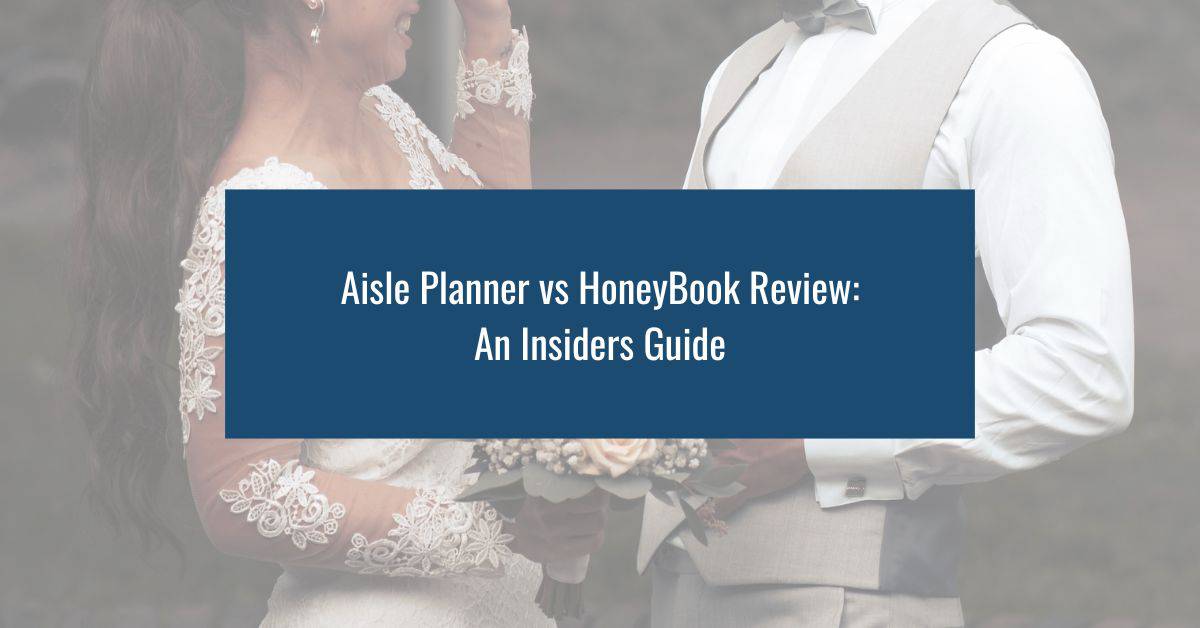
Comments are closed.